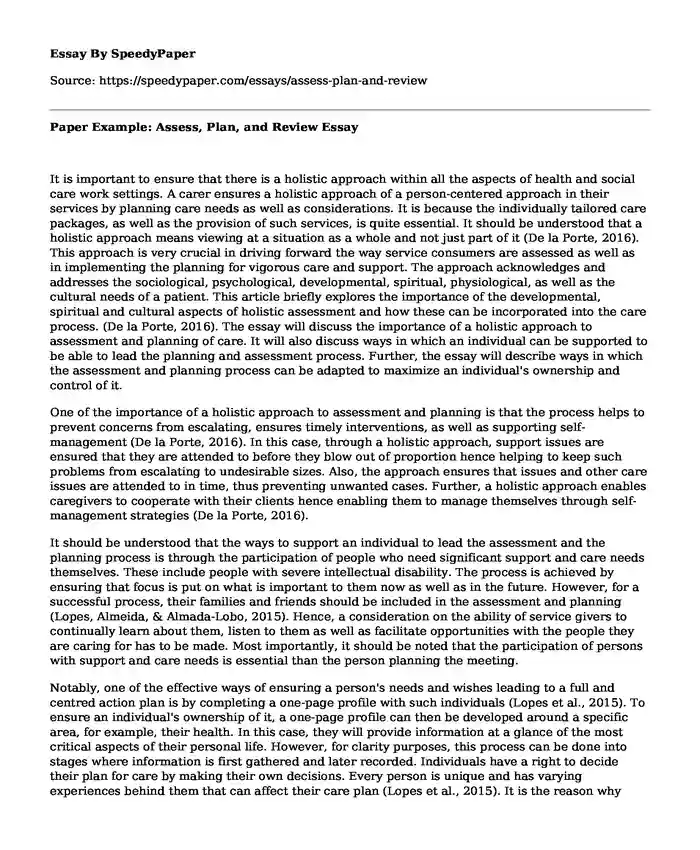
| Type of paper: | Course work |
| Categories: | Medicine Healthcare Human services |
| Pages: | 3 |
| Wordcount: | 704 words |
It is important to ensure that there is a holistic approach within all the aspects of health and social care work settings. A carer ensures a holistic approach of a person-centered approach in their services by planning care needs as well as considerations. It is because the individually tailored care packages, as well as the provision of such services, is quite essential. It should be understood that a holistic approach means viewing at a situation as a whole and not just part of it (De la Porte, 2016). This approach is very crucial in driving forward the way service consumers are assessed as well as in implementing the planning for vigorous care and support. The approach acknowledges and addresses the sociological, psychological, developmental, spiritual, physiological, as well as the cultural needs of a patient. This article briefly explores the importance of the developmental, spiritual and cultural aspects of holistic assessment and how these can be incorporated into the care process. (De la Porte, 2016). The essay will discuss the importance of a holistic approach to assessment and planning of care. It will also discuss ways in which an individual can be supported to be able to lead the planning and assessment process. Further, the essay will describe ways in which the assessment and planning process can be adapted to maximize an individual's ownership and control of it.
One of the importance of a holistic approach to assessment and planning is that the process helps to prevent concerns from escalating, ensures timely interventions, as well as supporting self-management (De la Porte, 2016). In this case, through a holistic approach, support issues are ensured that they are attended to before they blow out of proportion hence helping to keep such problems from escalating to undesirable sizes. Also, the approach ensures that issues and other care issues are attended to in time, thus preventing unwanted cases. Further, a holistic approach enables caregivers to cooperate with their clients hence enabling them to manage themselves through self-management strategies (De la Porte, 2016).
It should be understood that the ways to support an individual to lead the assessment and the planning process is through the participation of people who need significant support and care needs themselves. These include people with severe intellectual disability. The process is achieved by ensuring that focus is put on what is important to them now as well as in the future. However, for a successful process, their families and friends should be included in the assessment and planning (Lopes, Almeida, & Almada-Lobo, 2015). Hence, a consideration on the ability of service givers to continually learn about them, listen to them as well as facilitate opportunities with the people they are caring for has to be made. Most importantly, it should be noted that the participation of persons with support and care needs is essential than the person planning the meeting.
Notably, one of the effective ways of ensuring a person's needs and wishes leading to a full and centred action plan is by completing a one-page profile with such individuals (Lopes et al., 2015). To ensure an individual's ownership of it, a one-page profile can then be developed around a specific area, for example, their health. In this case, they will provide information at a glance of the most critical aspects of their personal life. However, for clarity purposes, this process can be done into stages where information is first gathered and later recorded. Individuals have a right to decide their plan for care by making their own decisions. Every person is unique and has varying experiences behind them that can affect their care plan (Lopes et al., 2015). It is the reason why care plans are designed for each individual as the general plan cannot provide quality care for every person. The procedure makes one feel control and ownership of the whole process of planning and assessment.
References
De la Porte, A. (2016). Spirituality and healthcare: Towards holistic people-centered healthcare in South Africa. HTS Teologiese Studies/Theological Studies, 72(4), 1-9. Retrieved from https://hts.org.za/index.php/hts/article/view/3127/7526
Lopes, M. A., Almeida, A. S., & Almada-Lobo, B. (2015). Handling healthcare workforce planning with care: where do we stand? Human resources for health, 13(1), 38. Retrieved from https://www.ncbi.nlm.nih.gov/pubmed/26003337
Cite this page
Paper Example: Assess, Plan, and Review. (2023, Mar 27). Retrieved from https://speedypaper.net/essays/assess-plan-and-review
Request Removal
If you are the original author of this essay and no longer wish to have it published on the SpeedyPaper website, please click below to request its removal:
- Tuck Everlasting - Literary Essay Sample
- Law Essay Example: The Loan to the Directors and Family Member
- Free Essay with a Lesson Plan in Elementary Statistics
- Essay Sample: August Wilson Life and Work and Frida Kahlo Life and Paintings
- Essay Example: Sacrificial Killing in Greek Mythology
- Design Choice Research Free essay
- Paper Example on Decline in Boeing Sales and Share Price
Popular categories




